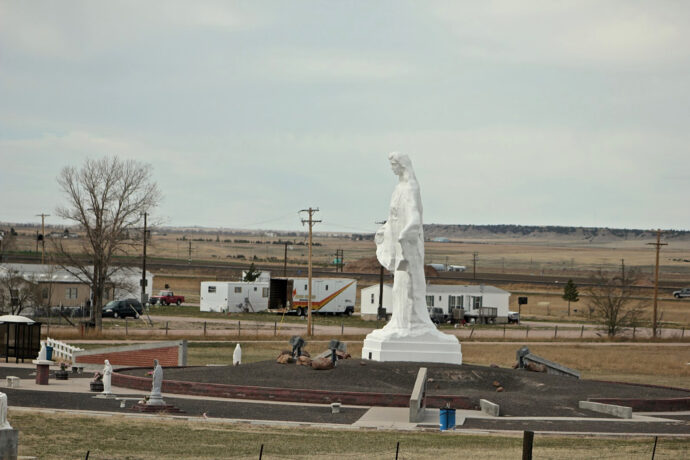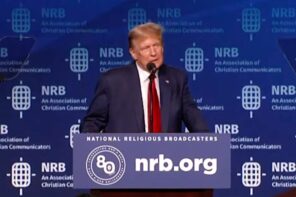Beyond the general Trump-induced anxiety that is affecting so many, and beyond the sense of shame that a man who spouted such exclusionary, hateful rhetoric could be elected president of the United States, progressive Catholics are in their own sort of hell over the rise of Trump. His election raises questions about how Catholics should respond personally and politically.
One source of dismay for some Catholics is that so many of their number broke decisively toward Trump and were critical to his victory in the Rust Belt swing states. “The Catholic vote went for Trump and many Catholics joined the non-voting defectors. That’s a scandal that calls into question the moral standing and integrity of most—not all—Catholics today,” Marquette University moral theologian Dan Maguire told RD.
To many, Catholic support for Trump feels like a repudiation of the Catholic social justice tradition. “Donald Trump’s campaign rhetoric and consequent election are rooted in fear and hate. This approach violates the gospel and Jesus’ commitment to the poor and marginalized. It threatens the last fifty years of progress with regard to civil rights, economic equity, a fair immigration policy, and especially a woman’s right to choose,” said Linda Pinto of CORPUS, an organization that represents married Catholic priests.
For many Catholics this rejection of bedrock Catholic values—and what it means for the country as a whole—is the source of much of the anxiety around the election of Trump. Steve Krueger, the head of Catholic Democrats, said his organization has been hearing from distressed Catholics in droves. “We’ve been hearing from our supporters like we haven’t heard over the past nine years. Catholic Democrats are feeling pain, fear, despair.” What’s surprising, says Krueger, is the range of people he’s heard from. “It’s all over the demographic landscape—older and younger, lawyers, blue collar workers, etc.—all used the word fear.”
The big question they all have, Krueger said, is how they should move forward as Catholics, especially because the institutional church is offering little guidance. On one hand, the Catholic bishops have focused on the church’s traditional support for immigrants and immigration, which would appear to be a repudiation of Trump. At the U.S. Conference of Catholic Bishops’ recently-concluded annual meeting, they elected Galveston-Houston Archbishop Daniel DiNardo, an outspoken advocate of immigrant rights, as president, and Los Angeles Archbishop José Gomez, a Mexican immigrant, and prominent support of immigrants, as vice president.
At the same time, says Krueger, the bishops are “acting in a very pragmatic way to develop a relationship with the Trump administration [at the expense of] losing their prophetic voice.” The U.S. bishops see Trump not merely as a potential ally in appointing a conservative justice to replace Antonin Scalia (who would help roll back abortion rights) but also in an aggressive expansion of “religious liberty.” In a letter to the advisory board of conservative Catholics that Trump assembled in October, he promised, “I will stand with Catholics and fight for you”:
I will defend your religious liberties and the right to fully and freely practice your religion, as individuals, business owners and academic institutions. I will make absolutely certain religious orders like The Little Sisters of Poor are not bullied by the federal government because of their religious beliefs.
And while the Catholic bishops were officially supportive of the Affordable Care Act (once they forced through the abortion restrictions they wanted), it’s not difficult to imagine them supporting a partial or full repeal of the ACA, and a much less robust replacement of it, if it got rid of the despised contraceptive mandate.
Just after his election, DiNardo said he hoped the bishops could “sit down with the administration or meet with them in some fashion, perhaps even in terms of Congress, relative to some pro-life things. I would certainly think some aspects of the Affordable Care Act would be great if we could sit down and see them worked out, relative to, let’s say, the Little Sisters of the Poor, and analogous things.”
Such “analogous things” would most likely include new protections for individuals and institutions that want to be able to discriminate against LGBTQ individuals and couples and create “carve-outs” from recognition of same-sex marriage. “Catholics are acutely aware of the threat posed by a potential alliance between VP-elect Pence and the USCCB in expanding religious exemptions,” said Marianne Duddy-Burke, head of the Catholic LGBTQ rights organization Dignity USA. She reports that members of Dignity were very concerned about “potential rollbacks of gains in civil rights.”
Most progressive Catholics I spoke with are focusing on individual and collective activism around social justice issues as the antidote to Trump. Krueger said a good approach is to follow what Jesus said in Matthew 10:16 when he sent the apostles out: “Behold, I am sending you like sheep in the midst of wolves; so be shrewd as serpents and simple as doves.”
“It’s incumbent on all of us, Catholics who care about social justice make sure that people who are less well off don’t get hurt,” said Jon O’Brien, president of Catholics for Choice. “We will be working with Catholics around the country to stand up and ensure that policies don’t hurt people who are less well off.” The leverage that progressives do have, noted O’Brien, is that Trump has to deliver to middle America. “We know where those folks go for their birth control. Defunding Planned Parenthood, cutting off contraceptive access, implementing a religious conservative agenda will hurt them,” he said.
O’Brien cautioned, however, that Democrats had to be careful to not fall into the trap of selling out progressive values like support for reproductive rights to win back working class Catholics. Krueger says that the best political way forward for the Democrats is what he calls a “50-state/all constituencies” strategy that includes a strong Catholic outreach component. He notes that Hillary Clinton’s outreach to Catholics was notably less robust than Barack Obama’s.
She didn’t recruit prominent Catholic backers the way that Obama did and skipped important Catholic outreach opportunities like a Saint Patrick’s Day event at Notre Dame when the campaign decided it didn’t need to focus on Catholics. Clinton paid the price in places like Michigan and Pennsylvania. “Hillary would have won Michigan if nine more Catholics per parish had switched votes,” Krueger noted, citing his own calculations on the impact of the Catholic vote in key swing states. In Wisconsin, it would have taken 18 more Catholics per parish to swing the outcome Clinton’s way, and in Pennsylvania, 34 more Catholics per parish.
In the end, maybe it’s helpful (or not) to realize, as Dan Maguire recently wrote, that there’s nothing new in dramatic, disconcerting swings in history:
The Exodus story in the Bible (when not misunderstood as history) is a metaphor for human societies. Properly interpreted, Exodus was saying that human social organization teeters between the Egyptian pyramidal model of one percent rule and the alternative Sinai model based on appropriate sharing where ‘there will be no poor among you’ (Deut. 15:4) and where swords will gradually be beaten into plowshares.
We have, says Maguire, been living in a plowshares moment since the end of the Second World War, a “brief moral interlude,” when “there was sharing and a healthy middle class.” While the United States has now broken faith with the Sinai sharing model, he says the “tragedy is terminal only if hope, the most revolutionary of emotions, also dies.”





